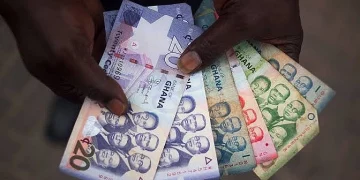Nigeria’s External Reserves Falls to 8-Month Low But Pick-Up in Sight
Nigeria’s external reserves plunged to its lowest levels in at least eight months in April driven by foreign debt servicing and the central bank’s sales of dollars into the market to shore up the naira.
The gross reserves which crossed over $40 billion at the end of 2024 has shed nearly $375 million month-on-month to $37.9 billion as of end April, 2025, marking the fourth consecutive monthly decline.
The reserves are now down by $2.9 billion year-to-date and now at their lowest level since August 2024, reflecting the CBN’s payment of FX liabilities.
The central bank injected $200 million into the FX market to shield the naira from tariff blows and sliding oil prices. Analysts at FBNQuest Merchant believes that the slowing participation of portfolio investors were among the reasons the Nigeria lender ramped up dollar sales.
“The decline reflects a combination of external debt service payments and increased FX sales by the CBN, following reduced participation by FPI investors,” the analysts said in a note on Monday.
“Although early May data suggests a modest pick-up, the broader reserve trajectory remains vulnerable to external headwinds.”
FMDQ FX turnover data revealed that FPI inflows continued to decline, dropping to N0.5 billion in April 2025 from N0.6 billion in March, N2.0 billion in February, and N2.3bn in January, highlighting investors’ flee to save haven as a result of the global uncertainty.
This has left the CBN with no choice but to ramp up FX sales to support market liquidity and ensure orderly market conditions.
But the tide is turning. The gross reserves has risen for two consecutive weeks this month, posting a modest accretion of around $163 million as of May 6, 2025 with analysts warning that fluctuating oil prices still put the reserves at risk as the CBN may continue to intervene, depleting the now growing reserves.
As at the end of April, Nigeria’s total reserves covered 9.5 months of merchandise imports and 7.9 months when services were included, based on Balance of Payments (BoP) data to September 2024.
“While May has opened with early signs of recovery, risks to Nigeria’s reserves persist—driven by weak oil price prospects, OPEC+ supply uncertainty, global inflation pressures, and softer global growth expectations,” analysts at FBNQuest Merchant warned.
Olayemi Cardoso, the governor of the CBN has continued to assure Nigerians and foreign investors that the Abuja-based lender remains committed to transparency and holding on to its core values of ensuring market stability, a situation that has made the country less impacted by the sweeping tariffs and global oil price drop.
“When concerns recently arose around tariffs and oil prices, Nigeria experienced only a moderate impact. That’s because of the central bank’s efforts in building market confidence and resilience,” Cardoso said at a panel during the launch of the World Bank’s Nigeria Development Update on Monday.







